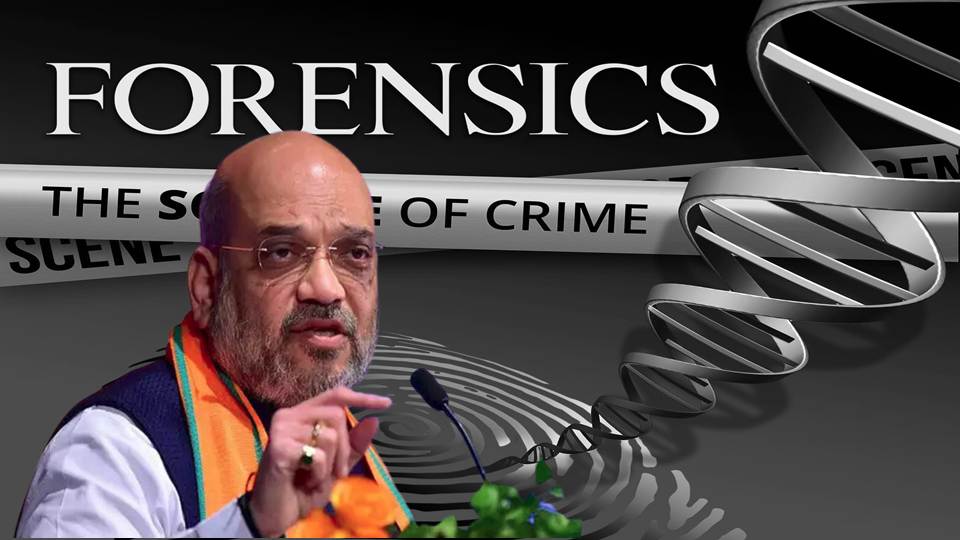The Modi government is working steadfastly to bring the much-needed reforms to the Criminal Justice System. It is gradually eliminating the bottlenecks that are hindering the process of speedy justice and letting go of criminals for the want of evidence. It has shown its commitment to bringing in major reforms to the regressive colonial laws. The recent announcement by the Union Home Minister Amit Shah will be a major boost in this long battle to improve the criminal justice system.
Forensic Science: A game changer against criminals
Amit Shah made a bold announcement stating that the Central government is aiming to make forensic investigation “compulsory and legal” for grave offences. He stressed that it will be mandatory to do forensic investigation in cases where the offences for the crime is more than six years.
He said, “..we are going to make the provision of forensic evidence compulsory and legal for offences attracting more than six years of punishment”.
Also Read: Amit Shah’s clear stance – No modernization without women
He also stated that the government will offer the logistical and infrastructure facilities required to boost the criminal justice system. He emphasised that the government will provide a forensic mobile investigation facility in each district of the country. It will also create a legal structure to maintain the independence and partiality of the investigation.
Shah highlighted the initiative of the Modi government to indigenise laws that were drafted during the Colonial time, assuring that the government is in consultation with domain experts to bring in much-needed change in the CrPC, IPC and Evidence Act.
Also Read: Police Force has long been used as private militias by state governments. Amit Shah is changing that
He said, “Under Prime Minister Narendra Modi’s leadership, the central government is going to make changes in the Indian Penal Code (IPC), Criminal Procedure Code (CrPC) and the Evidence Act, because nobody saw these laws from an Indian perspective after independence. These laws need to be reframed from the perspective of independent India. Therefore, we have been consulting a lot of people to change the IPC, CrPC and the Evidence Act”.
These remarks were made while addressing the first convocation ceremony of the National Forensic Sciences University (NFSU), Gandhi Nagar as its chief guest.
Also Read: Criminals will have no respite under the Criminal Procedure Identification Bill 2022
Assuring the graduating NFSU students of their future, he made it categorically clear that none of them will be left without placement saying, “When forensic evidence will be made compulsory and legal for offences with more than six years of punishment, then you can imagine how many forensic science expert graduates and double graduates will be required”.
Institutional approach
Home Minister also inaugurated three Centres of Excellence in DNA Forensics, Cyber Security, and Investigative and Forensic Psychology at the NFSU. He prophesied that this will strengthen the criminal justice system in the nation and will take India ahead.
Also Read: Amit Shah delegitimizes “third-degree torture” that Police uses to close cases
He asserted, “These three centres will also be the big centres of research and development apart from education and training. I can assure you that with the new journey in the field of research and development, India will become the global hub of forensic science in these three sectors. We will be at the forefront of the world in this direction”.
Creating stringent rules will not fix the problem or increase the conviction rate; it will take independent and strong institutions to make it a reality. Therefore, these three centres of excellence will be critical in increasing the conviction rate and instilling fear of the law in criminals.
Forensic science will drastically reduce the time required to prove an accused’s innocence or guilt, which would have taken much longer without the assistance of modern technology. Furthermore, it will increase the conviction rate as lengthy trials give enough scope for evidence tampering and other irregularities. If implemented quickly and fairly, it has the potential to raise the conviction rate more than in developed countries.
Fortunately, these major decisions of the Central government will ease many bottlenecks hindering the speedy delivery of Justice while increasing the conviction rate through the use of technology. It gives hope that Justice will prevail and no criminal will be allowed to go scot-free for the want of evidence and that under trials will get justice.
Support TFI:
Support us to strengthen the ‘Right’ ideology of cultural nationalism by purchasing the best quality garments from TFI-STORE.COM
